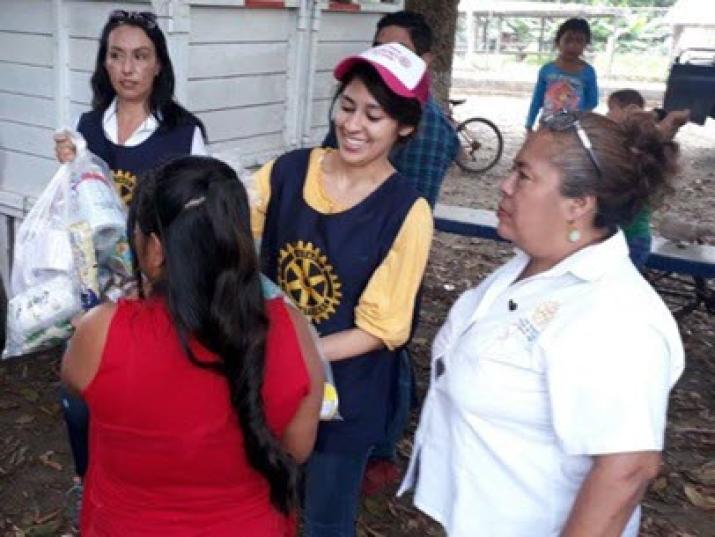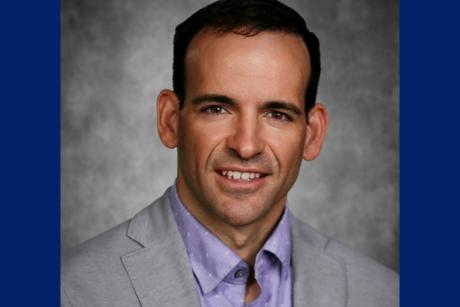
Briana Acosta (center) joins fellow Rotary members in distributing care packages to victims of Mexico's September 2017 earthquake, which mostly affected Chiapas and Oaxaca.
Published April 23, 2018, last updated on April 25, 2018 under Education News
Undergraduate global health alumna Briana Acosta has known since she was a child that she wanted to spend her life pursuing a career that positively impacts other people. When she discovered global health, she knew she had found the career she’d been looking for. After graduating with distinction from Duke in 2017 with majors in global health and cultural anthropology, Acosta is now conducting research in Mexico as a Rotary Global Scholar.
Discovering Social and Economic Determinants of Health
Acosta’s ambition to help eliminate global health disparities was largely shaped by her experiences as a Latina youth in the United States. Growing up in Houston, Texas, she connected with people from a wide range of ethnic and economic backgrounds and witnessed first-hand how these identities impact health. “These experiences led me to my majors at Duke and have inspired my passion for using the anthropological approach to understand how diverse people can achieve health in contexts of marginalization,” she said.
Reading the book Mountains Beyond Mountains by Tracy Kidder opened Acosta’s eyes to the vast array of health-related careers she could pursue. The book chronicles the life of anthropologist and physician Paul Farmer, who began his career working to innovatively improve health in Haiti. (Farmer, incidentally, is a Duke graduate and Duke Global Health Institute board member.) Farmer’s anthropological work especially interested Acosta, as she realized how many factors outside the control of an individual determine their health. “After reading about Dr. Farmer’s work, I remember thinking, ‘This is exactly what I want to do for my career,’” she said.
Acosta fused her interests in anthropology and global health after taking an international law and global health class with DGHI affiliate Catherine Admay. The class helped Acosta realize she could approach health from a social science perspective. As she learned more about global health, Acosta developed a passion for applying the anthropological perspective to issues that have strong psychosocial components, such as intimate partner violence (IPV), HIV/AIDS and alcoholism. She is also interested in problems that Latinx, migrant and Latin American indigenous populations face.
Discovering the Power of Health at WISER
Acosta completed the experiential learning component of her major through the Women’s Institute of Secondary Education and Research (WISER) Duke Engage program. As a teacher in the WISERBridge program in Muhuru Bay, Kenya, Acosta taught seventh and eighth grade students science lessons that centered around topics of reproduction, nutrition, HIV/AIDS, sexually transmitted infections, personal hygiene and sanitation.
Teaching gave Acosta an opportunity to improve gender equity and contribute to the general education of her students. “I learned how much of an impact education has on health, since education brings confidence and motivation, which empower a girl to harness her own agency in situations that affect her health,” she said.
Investigating How IPV Affects Immigrant Latina Mothers
In her senior year, Acosta conducted a thesis project that qualitatively investigated how IPV affects the parenting experiences of immigrant Latina mothers in the Triangle area of North Carolina, paying particular attention to psychosocial health effects. “To carry out this project, I forged collaborative partnerships with local IPV, Latinx and other community organizations to learn about the population of interest and to work with them on specific approaches to the research, the recruitment of potential participants, data analysis and the presentation and application of my results,” said Acosta. She collected data through in-depth individual interviews, participant observation and consultation with members of the local community who had significant experience with issues related to IPV.
Based on conclusions from her research, Acosta recommended the creation of a local program aimed at helping mothers recovering from IPV build strong relationships with their children, achieve health for themselves and their children, and begin to overcome structural violence. She is currently discussing the possibility of making a program like this a reality in partnership with several non-profit organizations. “By producing knowledge that can inform primary, secondary and tertiary prevention efforts against IPV, my senior thesis represents a step toward the ultimate goal of ending the intergenerational cycle of IPV, since the elimination of IPV depends on its prevention among each new generation,” said Acosta.
Continuing Research Abroad
After she graduated, Acosta began a year as a Rotary Global Scholar pursuing master’s-level coursework and research focused on the prevention of HIV/AIDS and other sexually transmitted infections among migrant indigenous youth in Chiapas, Mexico. “In addition to taking formal classes on the subject, by using community-based research methods from the fields of global health and medical anthropology, I am working to better understand this population’s struggle against this health threat and to potentially contribute to positive change,” said Acosta.
Acosta is grateful for the ways her global health degree prepared her for her current research. Highlights from classes included learning how to collaborate to design culturally sensitive interventions in DGHI professor David Boyd’s Global Health 101 class and gaining an understanding of structural violence in Social Determinants of Global Health.
Through her thesis project, Acosta learned how to carry out an anthropological research project in Spanish, develop collaborative partnerships with community organizations, talk to a marginalized population about traumatic issues, manage the collection and storage of sensitive data and educate participants about complex health issues—all skills that have proved indispensable for her research in Chiapas.
Above all, Acosta appreciates how professors encouraged her to embrace her identity in her work. “I intend to continue to allow my own story to inform my path within global health and to strengthen my connection and dedication to the populations I work with throughout my career,” she said.
Acosta fused her interests in anthropology and global health after taking an international law and global health class with DGHI affiliate Catherine Admay.


